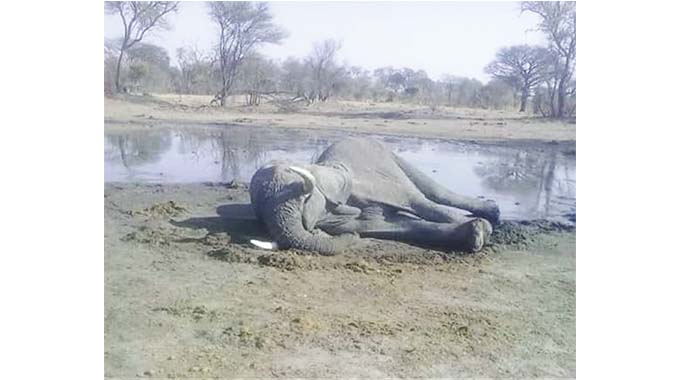
Leonard Ncube, Victoria Falls Reporter
GOVERNMENT has sent specimens to some laboratories outside the country to further investigate the cause of death of elephants in Pandamasue Forest outside Hwange National Park.
A total of 25 elephants have mysteriously died since the first 11 carcasses were discovered last month between Hwange and Victoria Falls.
Veterinary doctors from the Victoria Falls Wildlife Trust (VFWT) which partnered the Zimbabwe National Parks and Wildlife Management Authority (Zimparks) to investigate the deaths, suspect that bacterium called pasteurella multocida could be the cause of deaths.
The bacteria, which can also affect cattle and chickens killed about 200 000 antelopes in Kazakhstan a few years ago.
Doctors Chris Foggin and Roger Parry from VFWT who have been conducting tests have however said the laboratory in Victoria Falls has no capacity to dig deeper into the bacterium infection and identified some laboratories in South Africa, United Kingdom and United States for further research.
Environment, Climate, Tourism and Hospitality Industry Minister Nqobizitha Mangaliso Ndlovu who visited the lab on Friday, said results were expected within a fortnight.
“We visited Victoria Falls Wildlife Trust who are a private organisation which is closely working with us from national parks point of view. With regards to the specific issue of our elephants dying, the update that I have is that so far, we have 25 elephants that are believed to have died of similar disease. They are saying they can only suspect for now that there is a bacteria species that could be contributing to that but they are looking deeper into it.
“There are a number of issues that they are highlighting and flagging among them being the fact that because of the growing populations and the coming in of the dry season, animals have to walk long distances to look for water and they believe that this bacteria probably gets activated because of high stress levels,” said Minister Ndlovu.
Samples were supposed to be dispatched over the weekend.
“They have indicated that they do not have lab capacity to confirm this so they will be sending samples to a number of laboratories in South Africa, UK and the US and we hope within two weeks we will be getting the results. We expect to be sending these samples either tomorrow (last Saturday) or day after (yesterday). We are just finalising the papers with Zimparks,” said Minister Ndlovu.
Briefing the Minister, VFWT’s Dr Foggin said other causes like poisoning have been ruled out and it is suspected that the bacterial infection is triggered by stress conditions related to overpopulation and drought.
In neighbouring Botswana where close to 400 elephants died since May in eastern Okavango, Seronga and Delta areas, the cause remains mysterious after samples that were sent to laboratories in Zimbabwe and South Africa proved inconclusive.
Last year Zimbabwe lost about 200 elephants in Hwange National Park between September and November due to drought.-@ncubeleon
